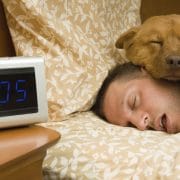Exercise, Nutrition & Sleep
 Hugh Van Cuylenburg from The Resilience Project talks about 3 daily research-backed activities that have been shown to help prevent mental health issues in children and adults, and improve symptoms where there are existing problems. These 3 activities are:
Hugh Van Cuylenburg from The Resilience Project talks about 3 daily research-backed activities that have been shown to help prevent mental health issues in children and adults, and improve symptoms where there are existing problems. These 3 activities are:
- Gratitude
- Mindfulness
- Empathy.
The research is showing if you practise these 3 things everyday for 21 days it will improve your happiness.
Sounds simple! Although these tools are the focus of his talks, he did say they will not work without exercise, good nutrition and sleep – so in this blog we’ll explore why that is.
Exercise
Moving your body a lot (whether it’s sport or walking the dog) will release feel-good chemicals (hormones) in your body called endorphins. You want endorphins because they make you feel happy and relaxed. Exercise also releases other chemicals important for mood and motivation, called serotonin and dopamine – and if that’s not enough, it releases growth factors which help your brain to grow and adapt (a process known as neuroplasticity). Conversely, sitting for hours on end, on computer games, or computer or watching TV makes most people feel tired and grumpy and is disruptive to our brain chemistry.
Nutrition
Having a few treats every now can make us feel happy, but when we have too many it can affect our mood. There is a connection between what you eat and how you feel. Research is showing that if you eat lots of fruit, vegetables and whole-grains it can boost your mood. Eating loads of sugar and processed food (ie ‘junk food’) may cause your mood to decline. Although it’s complex, this could be related to the link between our gut and the brain (called the gut-brain axis) – for example, over 90 percent of the mood enhancing neurotransmitter serotonin is produced in our gut and not our brain. If our gut isn’t happy, it sends messages up to the brain and in turn affects our mood.
Sleep
Sleep is as important as nutrition and exercise. Nothing good comes from not getting enough sleep. Sleep affects mood, learning and behaviour. It also helps us get better if we’re sick. When we’re sick, sleep produces infection-fighting proteins called cytokines, which also make us feel sleepy. That’s why when we’re not feeling well, we also feel tired. It’s our body telling us to rest. Sleep is also the time when our brains flush out toxins and repair and strengthen our brain cells. It’s like sleep is the time our brains take out the rubbish.

So, in summary – practising gratitude, mindfulness and empathy along with eating well, moving a lot and getting a good night’s sleep are the keys to a healthy, happy life.






 WHY DOES IT WORK?
WHY DOES IT WORK?
 Sleep is affected by many things. When you think of what affects your sleep, the usual suspects are things like caffeine, alcohol, stress, noise. What has come to light (pun intended) is our increased use of artificial light which is affecting our sleep. It may be time to question Thomas Edison when he reassured that electric light ‘is in no way harmful to health, nor does it affect the soundness of sleep’
Sleep is affected by many things. When you think of what affects your sleep, the usual suspects are things like caffeine, alcohol, stress, noise. What has come to light (pun intended) is our increased use of artificial light which is affecting our sleep. It may be time to question Thomas Edison when he reassured that electric light ‘is in no way harmful to health, nor does it affect the soundness of sleep’




 Sleep plays a vital role in good health and well-being throughout your life. Getting enough quality sleep at the right times can help protect your mental health, physical health, quality of life, and safety.
Sleep plays a vital role in good health and well-being throughout your life. Getting enough quality sleep at the right times can help protect your mental health, physical health, quality of life, and safety.